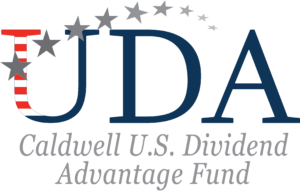Month End Recap:
For the month of August, the Caldwell U.S. Dividend Advantage Fund (UDA or Fund) declined -1.4% versus a gain of 1.3% for the S&P 500 Total Return Index (Index)1. From a sector standpoint, Materials, Healthcare, and Energy were relative outperformers, whereas Utilities, Industrials, and Information Technology underperformed.
Top performers in the month of August were Agnico Eagle Mines (AEM), TJX Companies (TJX), and T-Mobile U.S. (TMUS)2. AEM rerated higher after the company reported record results supported by stronger production, lower costs, and robust free cash flow. Management highlighted improved margins and rising cash generation, which drove debt reduction, a shift to a net cash position, and the resumption of share buybacks. Guidance was reiterated with operations running ahead of plan, while progress at Malartic continued with shaft expansion and plans for a second shaft that could meaningfully lift underground output. TJX continued to perform well after delivering strong revenue and earnings, with comparable sales up across all divisions. Gross margin expanded on cost discipline, and management raised full-year guidance for both comparable sales and earnings per share. A strong start to back-to-school underscored momentum heading into the holidays, reinforcing confidence in the company’s ability to capture share from full-price retailers and sustain earnings growth. TMUS maintained its momentum after having reported strong quarterly results in the prior month, with record postpaid phone adds, accelerating service revenue, and margin expansion. Management raised guidance for subscribers, EBITDA, and free cash flow, while rural gains, premium plan uptake, and new services like direct-to-cell reinforced confidence in its growth trajectory.
During the month of August, the Fund initiated positions in Intuit (INTU), eBay (EBAY), and TKO Group Holdings (TKO).
INTU is a leading provider of financial software through its QuickBooks, TurboTax, and Credit Karma platforms. The company is well positioned for sustained double-digit growth, supported by strong momentum in Credit Karma, resilient performance in TurboTax, and mid-teens expansion in the QuickBooks ecosystem excluding Mailchimp. Secular digitization tailwinds, growing adoption of AI-driven capabilities, and opportunities in tax full-service offerings provide additional levers for expansion.
EBAY is a global eCommerce platform undergoing a turnaround with a renewed focus on growth verticals, payments, and advertising. The company is repositioning itself through targeted M&A in focused verticals, supporting both revenue diversification and higher-margin opportunities. These initiatives are expected to accelerate growth, enhance monetization, and strengthen its competitive positioning.
TKO is a leading global sports and entertainment company with valuable media rights across UFC (Ultimate Fighting Championship) and WWE (World Wrestling Entertainment). The business is positioned for significant upside from upcoming content rights renewals, which should unlock higher value given strong demand for premium live programming. In addition, sponsorships represent a high-margin, underpenetrated revenue stream that has shown strong momentum in recent quarters, providing another lever for growth and earnings expansion.
The Fund held an 8.4% cash weighting at month-end. While we remain mindful of the macro environment, the Fund employs a bottom-up investment approach designed to seek out attractive investment opportunities in any market. Over the long run, given its unique momentum-driven investment approach and focus on well-managed, dividend growth companies, we believe UDA is well-positioned to provide strong performance by way of both attractive regular monthly distributions and long-term capital appreciation potential. We expect that our approach to dividend growth investing should continue to provide a means of generating compelling risk-adjusted returns for our investors over the long term.
1All returns (for the fund, individual stocks and sectors) are in total return, Canadian dollar terms. All stock returns represent performance for the full period noted. All fund returns are in respect of Series F.
Standard performance as at August 31, 2025:
Caldwell U.S. Dividend Advantage Fund (Series F): 1 Year: -4.1%, 3 year: 7.3%, 5 year: 8.5%, 10 year: 8.1%, Since Inception (June 19, 2015): 7.9%.
S&P500 Total Return Index: 1 Year: 18.0%, 3 year: 21.4%, 5 year: 15.9%, 10 year: 15,0%, Since Inception (June 19, 2015): 14.8%.
2Actual investments, first purchased: AEM 4/21/2025, TJX 4/21/2025, TMUS 3/26/2025.
All data is as of August 31, 2025 sourced from Morningstar Direct or S&P Capital IQ, unless otherwise indicated. Fund returns are from FundData. UDA, Index total return numbers, sector returns and individual stocks returns are in CAD terms. The Fund was first offered to the public as a closed-end investment since May 28, 2015. Effective November 15, 2018 the Fund was converted into an open-end mutual fund such that all units held were redesignated as Series F units. Performance prior to the conversion date would have differed had the Fund been subject to the same investment restrictions and practices of the current open-end mutual fund.
The information contained herein provides general information about the Fund at a point in time. Investors are strongly encouraged to consult with a financial advisor and review the Simplified Prospectus and Fund Facts documents carefully prior to making investment decisions about the Fund. Commissions, trailing commissions, management fees and expenses all may be associated with mutual fund investments. Rates of returns, unless otherwise indicated, are the historical annual compounded returns including changes in unit value and reinvestment of all distributions and do not take into account sales, redemption, distribution or optional charges or income taxes payable by any unitholder that would have reduced returns. Mutual funds are not guaranteed; their values change frequently and past performance may not be repeated. The payment of distributions should not be confused with a fund’s performance, rate of return or yield. If distributions paid are greater than the performance of the fund, your original investment will shrink. Distributions paid as a result of capital gains realized by a fund, and income and dividends earned by a fund, are taxable in your hands in the year they are paid. Your adjusted cost base (“ACB”) will be reduced by the amount of any returns of capital and should your ACB fall below zero, you will have to pay capital gains tax on the amount below zero.
Publication date: September 17, 2025.

